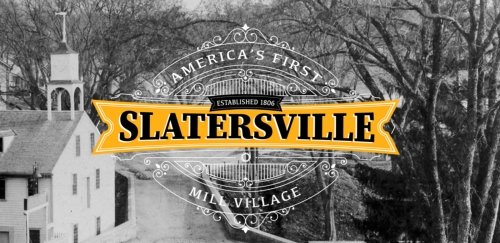RI-PBS is Airing Historical Documentary Series by RIC Film Studies Alum
- News & Events
- News
- RI-PBS is Airing Historical Documentary Series by RIC Film Studies Alum

Over 10 years in the making, “Slatersville” is a documentary by award-winning filmmaker Christian de Rezendes that tells the story of a mill village in northern Rhode Island that ignited the American Industrial Revolution.
“Slatersville: America’s First Mill Village,” directed, produced and edited by award-winning filmmaker Christian de Rezendes ’00 was inspired by his fascination with small towns.
“Films about small towns, like ‘The Last Picture Show,’ have been my biggest influences,” he says. “In ‘The Last Picture Show,’ the theater, which is the center of people’s lives in the town, closes; and in the film’s sequel, ‘Texasville,’ the theater remains abandoned and left to rot. I was really hit by that. I saw my hometown of Slatersville reflected in these films.”
de Rezendes first shot footage of the Slatersville abandoned mill as a senior in high school. “I was blown away by the fact that this beautiful mill was sitting there rotting,” he says.
Years later, after earning a film studies degree at RIC in 2000 and becoming an award-winning filmmaker, de Rezendes revisited the mill in 2005 and again in 2012 and wound up producing an 11-episode, two-season, documentary series based on it.

Filmed across seven states and the U.K., “Slatersville” retraces the 200-year history of the first industrialized mill village in the United States, located in the Blackstone Valley of northern Rhode Island. It begins with the story of Samuel Slater, a native of England, who introduced the first cotton mill in America and who became known as the father of the American Industrial Revolution.
Through hundreds of interviews, thousands of images and historic materials, some of which have never been seen by the public nor by historians, de Rezendes unfolds the story of American industrialization. The viewer discovers how Slater’s textile industry was supported by Southern slave labor – Black men, women and children who picked the cotton that fed his machines. The viewer also sees how child immigrants as young as six years old worked 70-hour weeks in the mill and lost digits and limbs to accidents on the machines. The strength of this documentary is the strength of its research.
“Truthfully, when I started the film, I didn’t know 90 percent of the history that wound up making up the film,” says de Rezendes. “In fact, I remember when I told someone I was working on a documentary about Slatersville, he kind of chuckled and said, ‘How long is that film going to be? Five minutes?’ There just didn’t seem to be a lot to tell about Slatersville. It takes about five minutes to drive from one end of town to the other.”
In fact, there’s a lot to tell about Slatersville. What de Rezendes thought would be a 90-minute film turned into a 12-hour series.
Over the 10 years it took to complete the first season of “Slatersville” and roughly one-third of the second season, de Rezendes hired as production assistants 10 full-time student interns and six part-time interns from Rhode Island College. All were film studies majors, except for one history major. You can check them out in the opening and ending credits.
When asked what he is most proud of, de Rezendes replies, “The aspect of time. I’ve interviewed over 140 people over the span of 10 years. I’ve been filming this so long, 26 people have died in the interim and others have aged tremendously. Not a day of editing goes by where I don’t find out that someone I once interviewed has passed.”
With the relentless passage of time, the story of Slatersville has become not only the death of a mill village but a reminder of our own mortality.
All five episodes of Season 1 can be found on the Rhode Island PBS website: watch.ripbs.org. This is a film you don’t want to miss. It will be streaming on PBS for at least the next two years. de Rezendes is currently completing the second season of the series.
Learn more about RIC’s Film Studies Program.
